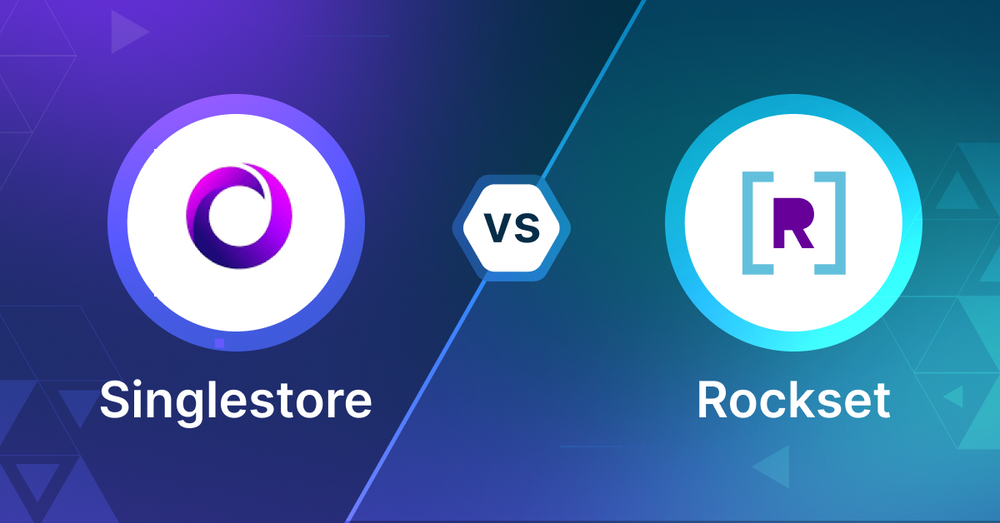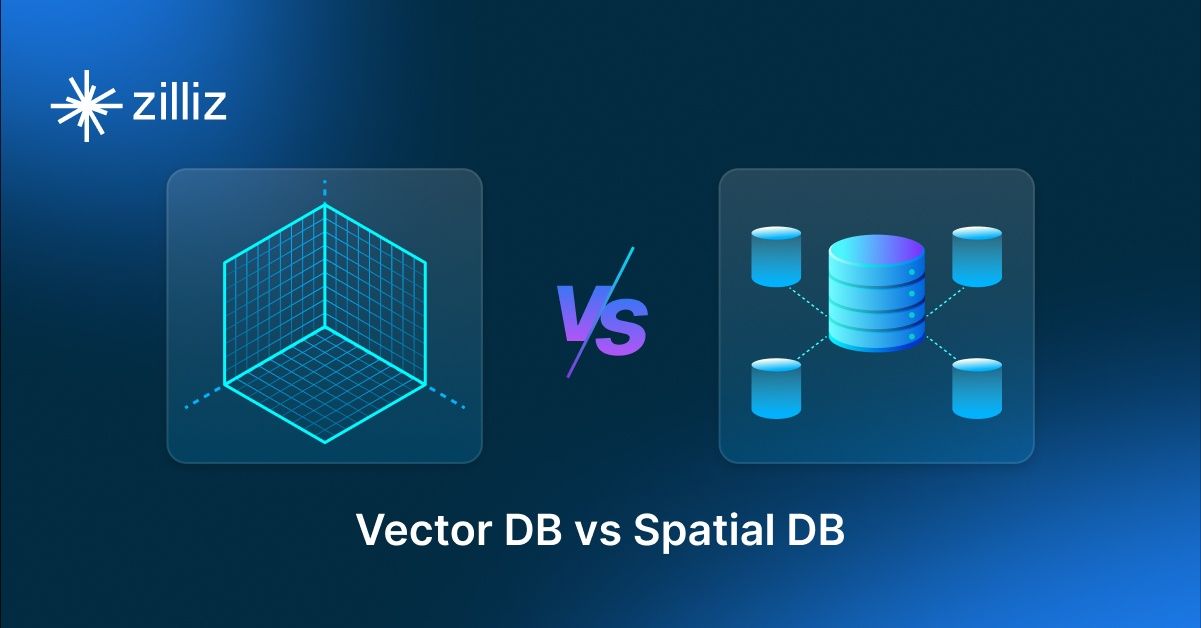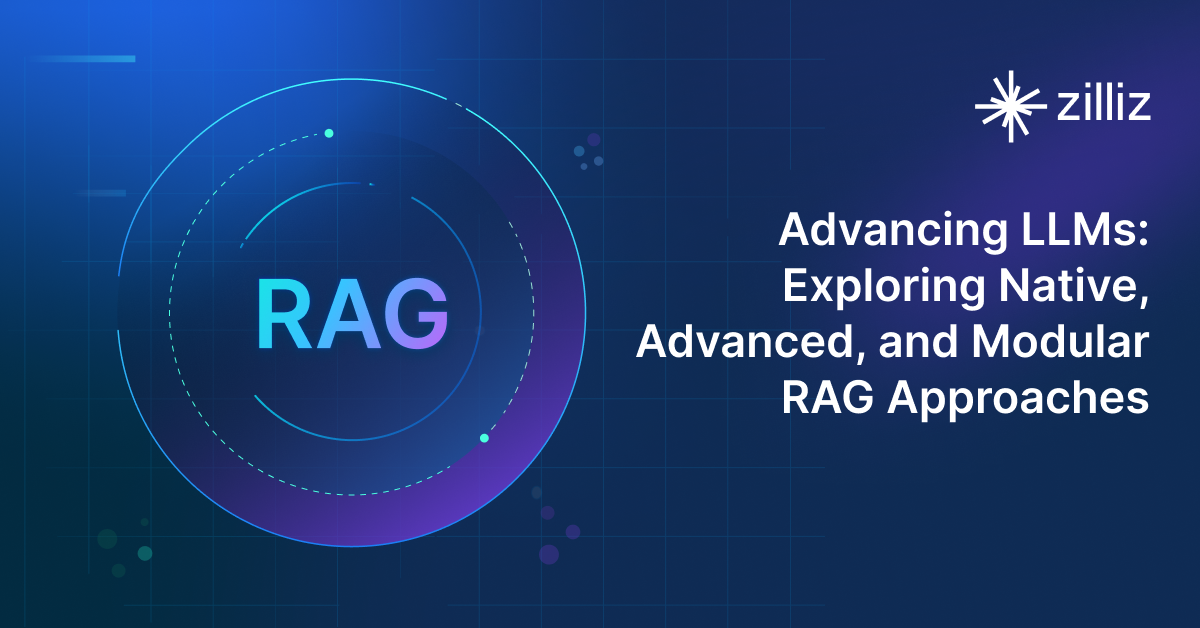SingleStore vs Rockset Choosing the Right Vector Database for Your AI Apps

What is a Vector Database?
Before we compare SingleStore and Rockset, let's first explore the concept of vector databases.
A vector database is specifically designed to store and query high-dimensional vectors, which are numerical representations of unstructured data. These vectors encode complex information, such as the semantic meaning of text, the visual features of images, or product attributes. By enabling efficient similarity searches, vector databases play a pivotal role in AI applications, allowing for more advanced data analysis and retrieval.
Common use cases for vector databases include e-commerce product recommendations, content discovery platforms, anomaly detection in cybersecurity, medical image analysis, and natural language processing (NLP) tasks. They also play a crucial role in Retrieval Augmented Generation (RAG), a technique that enhances the performance of large language models (LLMs) by providing external knowledge to reduce issues like AI hallucinations.
There are many types of vector databases available in the market, including:
- Purpose-built vector databases such as Milvus, Zilliz Cloud (fully managed Milvus)
- Vector search libraries such as Faiss and Annoy.
- Lightweight vector databases such as Chroma and Milvus Lite.
- Traditional databases with vector search add-ons capable of performing small-scale vector searches.
SingleStore is a distributed, relational, SQL database management system and Rockset is a search and analytics database with vector search capabilities as an add-on. Both have vector search capabilities as an add-on. This post compares their vector search capabilities.
SingleStore: Overview and Core Technology
SingleStore has made vector search possible by putting it in the database itself, so you don’t need separate vector databases in your tech stack. Vectors can be stored in regular database tables and searched with standard SQL queries. For example, you can search similar product images while filtering by price range or explore document embeddings while limiting results to specific departments. The system supports both semantic search using FLAT, IVF_FLAT, IVF_PQ, IVF_PQFS, HNSW_FLAT, and HNSW_PQ for vector index and dot product and Euclidean distance for similarity matching. This is super useful for applications like recommendation systems, image recognition and AI chatbots where similarity matching is fast.
At its core SingleStore is built for performance and scale. The database distributes the data across multiple nodes so you can handle large scale vector data operations. As your data grows you can just add more nodes and you’re good to go. The query processor can combine vector search with SQL operations so you don’t need to make multiple separate queries. Unlike vector only databases SingleStore gives you these capabilities as part of a full database so you can build AI features without managing multiple systems or dealing with complex data transfers.
For vector indexing SingleStore has two options. The first is exact k-nearest neighbors (kNN) search which finds the exact set of k nearest neighbors for a query vector. But for very large datasets or high concurrency SingleStore also supports Approximate Nearest Neighbor (ANN) search using vector indexing. ANN search can find k near neighbors much faster than exact kNN search sometimes by orders of magnitude. There’s a trade off between speed and accuracy - ANN is faster but may not return the exact set of k nearest neighbors. For applications with billions of vectors that need interactive response times and don’t need absolute precision ANN search is the way to go.
The technical implementation of vector indices in SingleStore has specific requirements. These indices can only be created on columnstore tables and must be created on a single column that stores the vector data. The system currently supports Vector Type(dimensions[, F32]) format, F32 is the only supported element type. This structured approach makes SingleStore great for applications like semantic search using vectors from large language models, retrieval-augmented generation (RAG) for focused text generation and image matching based on vector embeddings. By combining these with traditional database features SingleStore allows developers to build complex AI applications using SQL syntax while maintaining performance and scale.
Rockset: Overview and Core Technology
Rockset is a real-time search and analytics database for structured and unstructured data, including vector embeddings. Its sweet spot is ingesting, indexing and querying data in real-time so it’s great for applications that need up-to-the-second insights. Rockset supports both streaming and bulk data ingestion, can process high velocity event streams and change data capture (CDC) feeds in 1-2 seconds.
One of Rockset’s key features is Converged Indexing built on mutable RocksDB. This allows for in-place updates of vectors and metadata so it’s super efficient for scenarios where data changes frequently. Rockset can handle documents up to 40MB and supports vector dimensionality up to 200,000 so it’s good for a wide range of vector embedding use cases.
Rockset has vector search built into the core. It supports K-Nearest Neighbors (KNN) and Approximate Nearest Neighbors (ANN) search methods and uses a distributed FAISS index for scalability. Rockset is algorithm agnostic, so you can choose your own search implementation. The cost-based optimizer can dynamically choose between KNN and ANN search methods for optimal performance.
What’s unique about Rockset for vector search is the Converged Index which combines search, ANN, columnar and row indexes into one. This means you can handle a wide range of query patterns out of the box. Rockset also supports metadata filtering and hybrid search. The optimizer will choose the most efficient query path. Can search across multiple ANN fields, supports multi-modal models and has both SQL and REST APIs for query interface.
Key Differences
Search Methodology
SingleStore has a range of vector search options. At the core it has exact k-nearest neighbors (kNN) search for situations where precision is key. For larger datasets where speed is important SingleStore has Approximate Nearest Neighbor (ANN) search with various index types including FLAT, IVF_FLAT, IVF_PQ, IVF_PQFS, HNSW_FLAT, and HNSW_PQ. It supports both dot product and Euclidean distance similarity matching so developers have flexibility in how they measure vector similarity.
Rockset takes a different approach with its Converged Index technology which combines search, ANN, columnar and row indexes into a single system. This allows for efficient query processing across different data types and search patterns. Rockset supports both KNN and ANN search methods through a distributed FAISS index for scalability. One of the key features is its algorithm-agnostic design which allows teams to implement their own search methods if needed.
Data Handling
SingleStore has vector search integrated into its database so vector indices need to be created on columnstore tables. The system uses a specific Vector Type(dimensions[, F32]) format with F32 as the only supported element type. This structured approach makes SingleStore great for applications that need to combine traditional database operations with vector search capabilities like product recommendation systems or semantic search applications.
Rockset is great at handling different data types and formats. It can process both structured and unstructured data, documents up to 40MB and vector dimensionality up to 200,000. Built on mutable RocksDB, Rockset is good at real-time data processing, can ingest and process streaming data in 1-2 seconds. So it’s great for applications that require real-time analytics and frequent data updates.
Scalability and Performance
SingleStore scales by distributing the data across multiple nodes. As the data grows users can add more nodes to keep performance. The query processor combines vector search with SQL operations so no separate queries are needed. This is particularly useful for large scale applications that need to do complex operations involving both traditional data and vector search.
Rockset is focused on real-time search and analytics performance. Its architecture is designed to handle high velocity event streams. It has a cost based optimizer that chooses between KNN and ANN search methods based on the query requirements. This optimization along with its distributed architecture ensures performance is consistent as data grows and query complexity increases.
Flexibility and Integration
SingleStore has a SQL based interface for vector operations so it’s accessible to teams already familiar with SQL. It’s great for applications that combine traditional database features with vector search capabilities like semantic search and retrieval-augmented generation (RAG). While it’s limited to F32 vector type, this standardization makes development and optimization easier.
Rockset has more flexibility in its integration options, it has both SQL and REST APIs. It supports multi-modal models and can search across multiple ANN fields. Its flexible metadata filtering and hybrid search capabilities allow for complex queries that combine vector similarity with traditional search criteria. So it’s great for applications that require different search and analytics capabilities.
When to Choose SingleStore
SingleStore is the best choice for large scale applications that need traditional database capabilities and vector search in one system. It’s great for companies running recommendation engines, semantic search applications or AI powered applications where SQL compatibility is important and you need to combine vector operations with regular database queries. The technology excels at exact kNN search so it’s perfect for applications where search precision can’t be compromised, like financial services, e-commerce product recommendations or medical data analysis where accuracy matters.
When to Choose Rockset
Rockset is the best choice for applications that need real-time search and analytics, especially when dealing with changing data or streaming scenarios. It’s great for companies handling multiple data types and formats or need flexible search across high-dimensional vectors. The technology is perfect for use cases like real-time analytics dashboards, log analysis with vector search or applications that need to update search indices quickly, so it’s great for scenarios where data freshness matters and you need to combine full-text search with vector operations.
Conclusion
The choice between SingleStore and Rockset is ultimately up to your specific technical needs and use cases. SingleStore is great for a unified database with vector search, so good for applications that need to combine traditional data operations with vector search at scale. Rockset is great for real-time search and analytics, so good for applications that need to handle multiple data types and rapid updates. When making your decision consider your data update frequency, search precision, vector dimensionality needs and real-time processing requirements. Both are robust solutions but their strengths are different so they are good for different use cases.
Read this to get an overview of SingleStore and Rockset but to evaluate these you need to evaluate based on your use case. One tool that can help with that is VectorDBBench, an open-source benchmarking tool for vector database comparison. In the end, thorough benchmarking with your own datasets and query patterns will be key to making a decision between these two powerful but different approaches to vector search in distributed database systems.
Using Open-source VectorDBBench to Evaluate and Compare Vector Databases on Your Own
VectorDBBench is an open-source benchmarking tool for users who need high-performance data storage and retrieval systems, especially vector databases. This tool allows users to test and compare different vector database systems like Milvus and Zilliz Cloud (the managed Milvus) using their own datasets and find the one that fits their use cases. With VectorDBBench, users can make decisions based on actual vector database performance rather than marketing claims or hearsay.
VectorDBBench is written in Python and licensed under the MIT open-source license, meaning anyone can freely use, modify, and distribute it. The tool is actively maintained by a community of developers committed to improving its features and performance.
Download VectorDBBench from its GitHub repository to reproduce our benchmark results or obtain performance results on your own datasets.
Take a quick look at the performance of mainstream vector databases on the VectorDBBench Leaderboard.
Read the following blogs to learn more about vector database evaluation.
Further Resources about VectorDB, GenAI, and ML
- What is a Vector Database?
- SingleStore: Overview and Core Technology
- Rockset: Overview and Core Technology
- Key Differences
- Search Methodology
- Data Handling
- Scalability and Performance
- Flexibility and Integration
- When to Choose SingleStore
- When to Choose Rockset
- Conclusion
- Using Open-source VectorDBBench to Evaluate and Compare Vector Databases on Your Own
- Further Resources about VectorDB, GenAI, and ML
Content
Start Free, Scale Easily
Try the fully-managed vector database built for your GenAI applications.
Try Zilliz Cloud for FreeKeep Reading
Milvus/Zilliz + Surveillance: How Vector Databases Transform Multi-Camera Tracking
See how Milvus vector database enhances multi-camera tracking with similarity-based matching for better surveillance in retail, warehouses and transport hubs.

Vector Databases vs. Spatial Databases
Use a vector database for AI-powered similarity search; use a spatial database for geographic and geometric data analysis and querying.

Advancing LLMs: Exploring Native, Advanced, and Modular RAG Approaches
This post explores the key components of RAG, its evolution, technical implementation, evaluation methods, and potential for real-world applications.
The Definitive Guide to Choosing a Vector Database
Overwhelmed by all the options? Learn key features to look for & how to evaluate with your own data. Choose with confidence.